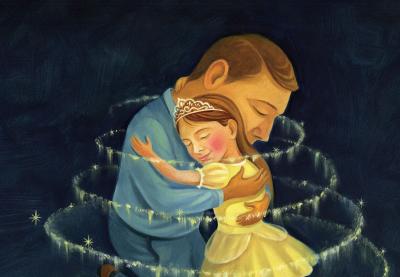On a normal day, Ronnie sweeps into the classroom wearing a Cinderella gown, ballet shoes and a tiara.
This morning, however, she drags herself to her seat with her mismatched shirt and jeans a wrinkly mess, and no socks to protect her tiny feet from the old, torn sneakers she is wearing. Ronnie’s normally bright and playful brown eyes seem flat and dull. They remain fixed on me as I move around, preparing the classroom for the day’s activities. I assume by the way she is hovering so close that she has something to tell me.
I am a 25-year-old, male kindergarten teacher early in my career. And nothing in any teacher’s manual has prepared me for what I am about to learn.
When my classroom setup is finished, I squat down low to face her. “What’s going on, Champ? Something on your mind?” Her eyes drop to the floor as she leans forward to whisper in my ear. “My mommy’s in her bedroom and won’t get up.”
Her words take a moment to register. When they finally do, a chill runs through my heart. “Ronnie, what do you mean, she won’t get up?” Looking back down at her hands, she says, “She just won’t.” As her eyes stay focused on her tiny fingers, I sense what this little girl is desperately trying to say but just cannot. Her mother is dead.
I pull Ronnie close, enveloping her suddenly quivering body in my arms. I can only choke out, “It’s OK sweetie. You are going to be all right.”
Earlier that morning, for whatever reason, Ronnie’s mother had reached her limit. I will never know what final event caused her to hit that breaking point, but whatever it was left her with what she perceived to be only one option, and she had exercised it.
Ronnie’s mother had always seemed like a bit of a flake. On the few days she visited the school, she was usually disheveled and smelled of alcohol. But she was not a problem parent. She seemed caring and conscientious. Ronnie appeared to be well cared for, and she and her mother had a very loving relationship. A social person, her mother liked to chat with me and the other teachers when she came in for conferences or school events. Her drinking habit did not appear to be affecting Ronnie adversely. If she was in some kind of trouble or was dealing with severe problems, she was doing a good job of hiding it.
Today, though, I know I must focus on Ronnie, not her mother. I try to imagine what the morning must have been like. I don’t know how Ronnie managed to get to school. I suppose she knew she had to get here, that this was where she should be. Everything seems a blur as I try to piece it all together—what has happened and what needs to happen now.
Obviously this must be reported, so I take Ronnie by the hand and head to the principal’s office, leaving my class with an assistant. As Ronnie explains her story to my principal and emergency services are called, I know from the look on Ronnie’s face that she will be loathe to repeat her dreadful secret.
When the Child Services workers arrive, they tell me that Ronnie will end up living with either her aunt or grandmother, neither of whom Ronnie knows well. I convince them to let Ronnie remain in my classroom for the rest of the day. I want her to have one more day of routine. Wherever she ends up, Ronnie won’t be getting the familiar love that she needs right now.
Ronnie’s classmates do not know what has happened, but they know instinctively that she has been hurt somehow.
Ronnie made me realize that my job as a teacher is not simply to fill young children’s heads with facts and ideas, but also to protect them.
Throughout the day Ronnie runs and skips on the playground and holds hands with another little girl as they sit and talk. I linger behind them to listen. Giggling and smiling, they discuss a favorite cartoon show. Every so often Ronnie walks over and leans on me or touches my hand. She sits next to me during snack time as we share some crackers, not talking. Occasionally I’ll rub her back or smooth her hair. For the remainder of the day she is my little satellite, orbiting around me, wandering off and then returning, looking up into my face, seeking my hand.
At the end of the day, Child Services returns for her. I am allowed a final goodbye and when I kneel down in front of her, Ronnie wraps her tiny arms around my neck and squeezes, but she does not cry. Then, with nothing more for me to offer, she is gone.
When Ronnie told me what she’d seen at home that morning, the awesome responsibility of what it means to really care for children came crashing down on me. Years later, it is a lesson I have not forgotten. In Ronnie’s case, it wasn’t a matter of what I did for her that day, but what more I could have been doing all along. Listening harder? Looking for signs of trouble?
Even if there was nothing more I could have done, Ronnie made me realize that my job as a teacher is not simply to fill young children’s heads with facts and ideas, but also to protect them. And—when I can’t protect them—to be there, a hand to hold when their fragile hearts are broken.

